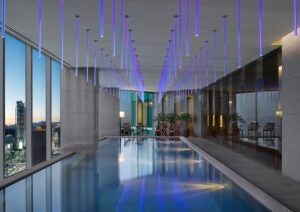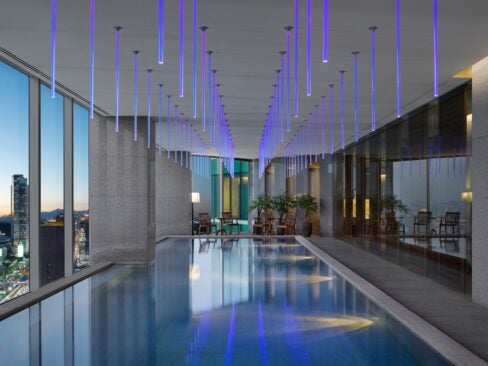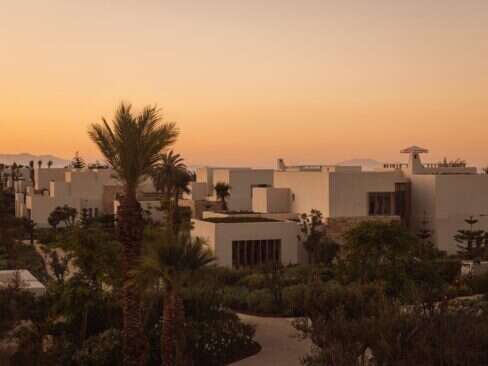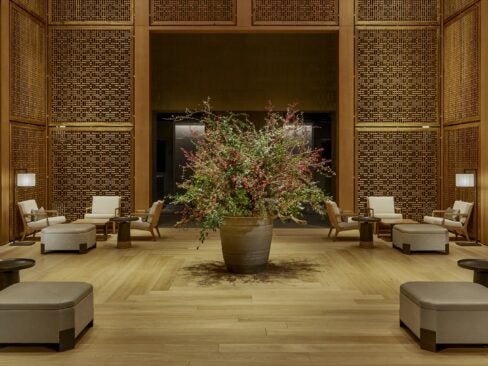In the post World War II travel boom, if Pan Am came to symbolize how aviation could shrink world, Air France showed how to do it with style. For over three decades beginning in the 1970s its Concorde was thought by many to epitomize beautiful, contemporary design and represented new, more chic way to travel. Pan Am of course was the bloated, over indulgent 747. About the same time, in 1972, Air France decided to introduce its savoir faire on the ground launching Le Meridien Hotels & Resorts to provide a “home outside of home for Air France passengers.” Pan Am was the more staid, white shoe InterContinental hotels.
The backing of the French national carrier led Le Meridien to expansion in global capitals, lush tropical paradises and far flung colonial business outposts. Like the speedy airplane’s commercially challenged history, the going on the ground was not all always smooth. Several ownership transitions muddled the concept, and in 2005 the brand was acquired by Starwood Hotels and Resorts. Over the past decade, nearly one-third of hotels have left the fold, but with a strong pipeline of new projects Le Meridien is now on a growth curve. Twelve openings are set for the next 12 months, including seven in North America.
Ironically it is a former InterCon executive who is behind the push. Anthony Ingham, Vice President Luxury & Design Brands, North America for Starwood says today’s portfolio is a contemporary, design-led lifestyle brand providing a New Perspective for curious, creative minds through a range of innovative, curated cultural experiences. He classifies the target customer as “people paid to generate ideas” so the emphasis is on providing a “creative environment.” Among the target industries are consulting, design, media, marketing, public relations, television and start-ups.
The experience, he says, begins with the lobby, and perhaps appropriate to a hotel founded by an airline, is referred to as they “hub.” In this case first impressions revolve around “a high impact art program” ranging from wall art to sculpture. Even key cards are “collectible” art and also provide access to a local institution which speaks to the goal of “unlocking the destination” for its right brain guests.
Communal tables, high and low furniture and a signature coffee bar have made the lobby a “hub” for guests instead of connecting passengers, and Ingham notes in Atlanta, when the new concept was introduced, food and beverage revenue tripled as creative types sipped lattes while brainstorming.
Giving its well traveled guests inspiration from the local environment extends to the guest rooms where for example, in Istanbul, images of the city’s surrounding hilly topography are on the ceiling above the bed.
Helping alleviate brain freeze and getting elite travelers onto their next big idea, Le Meridien is tapping into its French heritage and then adding a local twist. A new series of signature éclairs feature a cream cheese filling in Philadelphia as an ode to the city’s namesake spread, while in Chicago, home of Cracker Jack, you can have your French desert topped with salted caramel peanuts.
When the need to meet extends beyond just gathering your big thinkers at the “hub,” Le Meridien is bringing its Parisian flaire to meetings. Participating hotels offer a “make your own éclair” bar as a break option, either filling your own pastry or topping it.
For the idea minded who believe a body needs to be nourished each hotel offers a selection of blended juices and for others who think world problems or at least marketing challenges can be solved over a stiff drink, there are a series of localized “sparkling” cocktails on offer.
One paradigm changing aspect of the “idea economy” is that e-access means that creative work can be done from virtually anywhere. What this means for the chain is “idea businesses” are increasingly located and doing business more places. Openings in North America coming up include Tampa, a converted courthouse, Chicago suburb Oak Brook, Indianapolis, Charlotte, New Orleans, Columbus and Cleveland.
While Le Meridien with its Upper Upscale positioning in hotel jargon typically sits below a St. Regis or Four Seasons but above a Sheraton or Hilton, Ingham says as his brands expands into new markets, in a number of cities Le Meridien will be the top hotel in the market. It’s something the company’s founders probably would have liked to hear. Considering the inspiration Paris has historically provided for those who like to work their brain, the Starwood brand expects Tar Heels, Buckeyes and Buccaneers are ready for a dose of Vive Le France.













